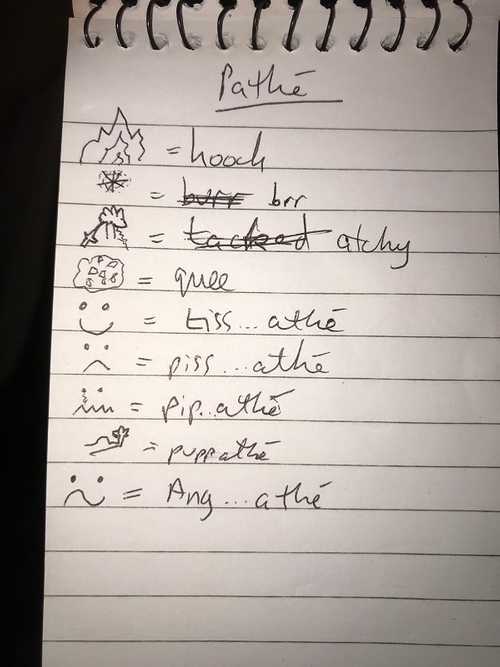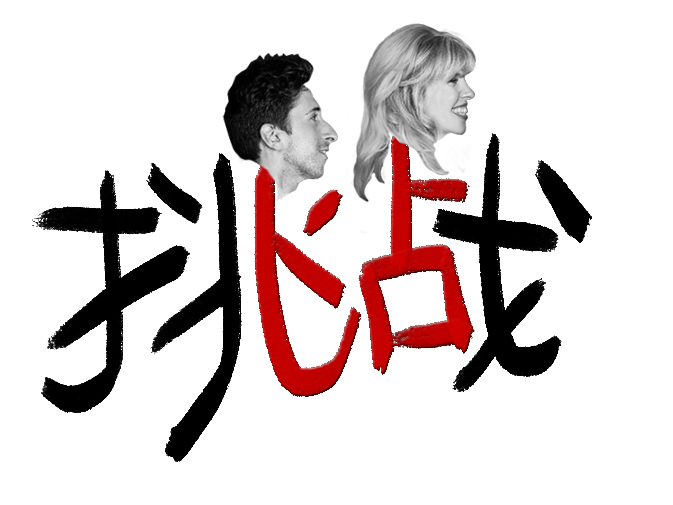Made-up Language
A popular format for sending us challenges seems to be: spend a day doing (insert ridiculous thing here). The advantage of these types of challenges is you can do them pretty much anywhere. Since we were planning on doing a boring travel day from Don Dhet to Thakhek, we thought that it might spice things up by attempting to complete Oliver Raizon’s challenge to “Spend a day speaking in a made-up language. You cannot use a single word from a real language with anyone, including each other.”
Upon waking up, Natalie starting babbling away trying to explain some quite advanced concept, while I was content with just finding a word for “hi”. We had a pen and paper and started to write down words we had agreed upon. Part of the rules stated that we could not write down any actual words, so our dictionary could only list our words without their English translations. Not the most useful.
To give you an idea for how we built our new language: we adopted a number system with the same structure as the Roman numerals, which reduced the number of new words we needed to remember; we also tried to create reusable prefixes and suffixes so we could build meaning; if a new word was difficult to explain, we would find a word to which it vaguely related and say this instead, followed by ‘toad’ (a nod to one of our ‘That’s not a Sandwich’ verses). This was to indicate that the chosen word was “not quite” the one we intended (explanatory video below). Half way through our system, we realised that some of our words may not completely stick with Oliver’s stringent “no words from any language” rule, so we changed things up a bit without getting overly pedantic (e.g. toad became ‘tuhd’). After all, it was proving difficult enough already.
For breakfast we had flip-flaps (pancakes). While eating, a dog snuffled up to Natalie. Unfortunately, her love of animals overcame her and she exclaimed “hello”. We looked at each other in horror, had we failed the challenge already? Upon examination of the challenge’s wording, I concluded it was ok since it said not to “use a single word from a real language with anyone”, so - at a push - perhaps a dog was ok. This did open up the possibility of having a proxy conversation via the dog, but that didn’t seem in the spirit of the challenge, plus the locals already thought we were bonkers.
Since we were staying on an island, we needed to catch a splishvore (boat) back to the main land. The “splish” part should be obvious, the “vore” means vehicle and was inspired by Natalie’s observation when she was cycling in London, that the large buses sometimes felt like herbivores out of Jurassic park. Unless you have cycled down Tottenham Court Road in rush hour, you will have trouble relating to this.
After a short wait we boarded a puppvore (coach, pupp means big) and settled in for a long ride. We continued to work on the language which we called “Raizon” in honour of our challenger.

Following some frustrating communication, I fancied some respite by listening to an audiobook. Hearing normal conversation must have lowered my guard, because I took my headphones out and said to Natalie “I think I’ll have a little snooze”. Plop. Could we carry on and forget this slip up? Would that undermine the whole thing, or would be foolish to give up when we had already made it to 3 pm. I think what made our made our minds up was that we were both feeling puppisspathé (strong negative feelings) about having to speak in Raizon. Though it began well and we enjoyed playing with new vocabulary, it was getting awful. So we concluded that this challenge had been a failure and pulled the plug.
I’m not really sure what we learnt or got out of the experience, other than to remind us both that we were - and still are - crap at languages, even ones we have made up entirely by ourselves… but at least we gave it a go. Do keep sending us your weird ideas.
p.s. This has nothing to do with the challenge, but I‘m quite proud of this drone video I took the day before, while staying on the island.
- Completed Challenges
- Upcoming Challenges
- Send us a Challenge

